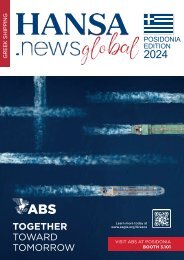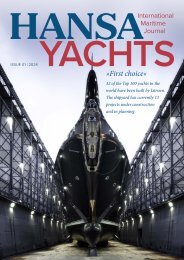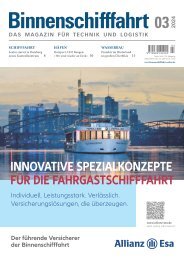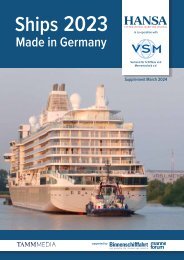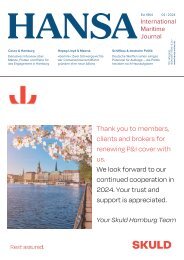HANSA 05-2017
Special Focus: NorShipping 2017 | HullPic Review | COMPIT Preview | Leonhardt & Blumberg | Sewol salvage | Tugs | German Banks | Tanker | Maritime Politics | Offshore Tender
Special Focus: NorShipping 2017 | HullPic Review | COMPIT Preview | Leonhardt & Blumberg | Sewol salvage | Tugs | German Banks | Tanker | Maritime Politics | Offshore Tender
Create successful ePaper yourself
Turn your PDF publications into a flip-book with our unique Google optimized e-Paper software.
5 Fragen an …<br />
Schifffahrt | Shipping<br />
ble from a EU perspective and that there<br />
are no explicit periods of applicability. For<br />
long-term business decisions these factors<br />
give rise to uncertainty due to a perceived<br />
risk of interpretative policy change.<br />
In some of the centres (Hong Kong and<br />
Vancouver), rules governing fiscal treatment<br />
are written in primary legislation,<br />
and perceived policy risks are marginal.<br />
Monitor Deloitte sees a need for a<br />
comprehensive policy for shipping with<br />
a focus on supporting the global competiveness<br />
of the sector. While emphasising<br />
the inherent global nature of shipping,<br />
the current maritime transport<br />
strategy focuses on waterborne transport<br />
internal to the EU. The global challenge<br />
to EU shipping requires a more<br />
globally oriented policy that should cut<br />
across policy fields like transport, taxation,<br />
environment, etc. and thereby cover<br />
the key competitiveness factors.<br />
Professional services and skills<br />
There is a marked difference between the<br />
EU and the five benchmarked centres, except<br />
Shanghai, at a more fundamental level<br />
in the way that professional services are actively<br />
included in policies. In four centres,<br />
the core ambition is to support the development<br />
of high value-added professional<br />
service jobs around the core shipping operations<br />
in order to develop the maritime<br />
cluster and its competitiveness. The EU<br />
does not have a similar policy in place.<br />
There is no significant financial gap in<br />
the EU regulatory framework for subsidies<br />
to training or to the labour-related costs<br />
such as provisions on exemption of seafarers’<br />
income tax and exemption of social<br />
contribution payments. However, there is<br />
a gap regarding the scope of the training.<br />
Within the EU, this is solely focused on EU<br />
seafarers, whereas the scope in other centres<br />
is wider and also includes upskilling<br />
in the maritime professional services sector<br />
and other onshore-based jobs.<br />
Flag attractiveness<br />
There are possible important policy gaps<br />
that may affect competitiveness negatively<br />
and possibly lead to relocation of<br />
activities and de-flagging to outside the<br />
EU. These are, among others, caused by<br />
a problematic introduction of EU legislation<br />
for international shipping and thereby<br />
introduction of different standards for<br />
EU flags and shipowners, causing additional<br />
administrative and technical requirements.<br />
Furthermore, some EU registers<br />
still stipulate specific nationality<br />
requirements and crewing restrictions<br />
that also lead to increased economic and<br />
administrative burdens. Lastly, there is a<br />
lack of cross-member state digital solutions<br />
that would allow EU shipping companies<br />
to benefit specifically from being<br />
registered under an EU flag.<br />
Deloitte warns about the implementation<br />
of regulations outside IMO/ILO as they increase<br />
the operating costs relative to flag<br />
states, such as Singapore. The city state has<br />
strategies to ensure that the regulation does<br />
not go beyond the international standards<br />
or further restrict operations through additional<br />
national requirements. This leads<br />
to lower operational costs and higher flag<br />
attractiveness.<br />
Ease of doing business<br />
Monitor Deloitte identified policy gaps<br />
that relate to the lack of focus on ease<br />
of doing business for shipping companies<br />
involved in global activities. The<br />
international centres provide examples<br />
of an approach where the perspective is<br />
global and as much on facilitating activities<br />
from abroad as on facilitating only<br />
internal activities. It also seems that a<br />
customer-related approach such as a<br />
one-stop shop, etc, is still missing rather<br />
often within the EU and its member<br />
states and the administrations involved.<br />
Availability of finance<br />
There is a number of policy gaps relating<br />
to the focus on mainly intra-EU<br />
investment support, the lack of transparency<br />
surrounding EU financial offerings,<br />
high administrative complexity<br />
and the uncertainties surrounding the<br />
new Basel regulations and their implications<br />
on ship financing through EUbased<br />
banks.<br />
It is stressed that approximately 70% of<br />
the EU fleet are private enterprises that<br />
rely primarily on commercial bank financing.<br />
The current regulatory framework<br />
for bank financing is already restrictive,<br />
and the Basel IV proposals will make<br />
ship financing from banks even more<br />
scarce. With regard to the proposed Basel<br />
IV regulations, Monitor Deloitte sees<br />
a need to include the consideration of the<br />
repercussions in the EU, especially on<br />
SME shipowners and operators who traditionally<br />
rely heavily on bank loans. This<br />
is in contrast to non-EU shipping companies<br />
that have more options for financing<br />
besides the traditional bank loans. ED<br />
Carsten Gierga<br />
Geschäftsführer<br />
EuroFlag Services –<br />
Agent für das Register Luxemburgs<br />
»Wir brauchen ein level playing field«<br />
Was sollte sich in der EU-Flaggenpolitik<br />
ändern?<br />
Carsten Gierga: Wir würden uns ein »level<br />
playing field«, also einheitliche Standards<br />
bei den Grundsatzfragen und deren einheitliche<br />
Einhaltung wünschen. So gibt es beispielsweise<br />
eine erhebliche Diskrepanz bei<br />
der Verpflichtung zur Sozialversicherung.<br />
Eine aktuelle Deloitte-Studie bemängelt<br />
fehlende digitale Lösungen von EU-Flaggen.<br />
Was ist Luxemburgs Antwort darauf?<br />
Gierga: Über die Auswertung digitaler Positionsdaten<br />
stellt Luxemburg unter anderem<br />
ein spezifisches Vorbereitungsprogramm<br />
für Hafenstaatskontrollen bereit.<br />
Darüber hinaus können Zertifikate für Seeleute<br />
komplett digital beantragt werden.<br />
Länder wie Singapur achten darauf, dass<br />
ihre Flaggen-Anforderungen nicht über<br />
internationale Standards hinausgehen.<br />
Wie ist es im Register Luxemburgs?<br />
Gierga: Luxemburg begleitet den technischen<br />
Zustand der Schiffe und die Einhaltung internationaler<br />
Standards aktiv. Im Bereich der<br />
Arbeitsbedingungen der Seeleute hat Luxemburg<br />
MLC frühzeitig ratifiziert und wendet<br />
europäisches Recht für die EU-Seeleute an.<br />
Wie wichtig ist den Reedern das Argument<br />
»Kosten« im Vergleich zum Service?<br />
Gierga: Das Kostenargument wiegt aktuell<br />
sehr schwer, aber auch hier ist Luxemburg<br />
im EU-Vergleich durchaus konkurrenzfähig<br />
und bietet weitreichenden Service.<br />
Welche Entwicklung erwarten Sie?<br />
Gierga: In den letzten lief es positiv, neue<br />
Schiffe kamen zur Flotte hinzu, auch europäische.<br />
Der Beginn des Jahres <strong>2017</strong> verlief<br />
recht erfreulich, und gerade jüngst haben<br />
einige Schiffe europäischer Eigner zur Flagge<br />
Luxemburgs gewechselt, unter der aktuell<br />
222 Schiffe fahren. Das Register wird<br />
wohl keines der weltweit größten werden,<br />
wer aber unter einer EU-Flagge fahren will<br />
und Wert auf Service legt, findet in Luxemburg<br />
ein konkurrenzfähiges Register mit<br />
einem weltweiten Service-Netzwerk vor.<br />
<strong>HANSA</strong> International Maritime Journal – 154. Jahrgang – <strong>2017</strong> – Nr. 5 31




